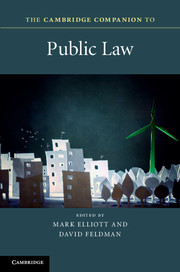Book contents
- Frontmatter
- Contents
- Notes on Contributors
- Introduction
- 1 The distinctiveness of public law
- 2 The politics of public law
- 3 The rule of law in public law
- 4 Legislative supremacy in a multidimensional constitution
- 5 The politics of accountability
- 6 Rights and democracy in UK public law
- 7 Public law values in the common law
- 8 Public law and public laws
- 9 Public law and privatisation
- 10 State architecture: subsidiarity, devolution, federalism and independence
- 11 Soft law never dies
- 12 The impact of public law litigation
- 13 Designing and operating constitutions in global context
- Index
- References
6 - Rights and democracy in UK public law
Published online by Cambridge University Press: 05 September 2015
- Frontmatter
- Contents
- Notes on Contributors
- Introduction
- 1 The distinctiveness of public law
- 2 The politics of public law
- 3 The rule of law in public law
- 4 Legislative supremacy in a multidimensional constitution
- 5 The politics of accountability
- 6 Rights and democracy in UK public law
- 7 Public law values in the common law
- 8 Public law and public laws
- 9 Public law and privatisation
- 10 State architecture: subsidiarity, devolution, federalism and independence
- 11 Soft law never dies
- 12 The impact of public law litigation
- 13 Designing and operating constitutions in global context
- Index
- References
Summary
Introduction
A central concern of contemporary constitutionalism is the protection and promotion of individual rights and freedoms. Drawing upon a natural law tradition which claims that people enjoy rights inherently, equally and inalienably by virtue of their humanity, rights are conceived as being prior to and foundational of, rather than derivative from, the constitutional and legal order. The archetypal constitutional form for the protection of rights is thus a bill or charter of fundamental rights, which acts as a set of guiding principles for, and – more importantly – judicially enforceable guarantees against, state action.
There is a long history of issuing declarations of traditional rights and freedoms in order to constrain tyrannous rulers – in the British constitutional tradition, for instance, Magna Carta (1215), the Petition of Right (1628), and the Bill of Rights/Claim of Right (1689). However, the notion of universal human rights as the foundation for constitutional government is a more recent phenomenon, first asserted during the American and French revolutions in the Declaration of Independence (1776) and the Declaration of the Rights of Man and the Citizen (1789), and in the writings of Jean Jacques Rousseau and Thomas Paine. The US Bill of Rights, adopted in 1791, is the first recognisably modern constitutional rights guarantee, in the sense of a legally binding and judicially enforceable document, hierarchically superior to other laws. However, it was only in the twentieth century, and particularly after World War II, that rights came to occupy a central place in American constitutional law. The post-war period also saw the proliferation of international and regional declarations of rights, and the widespread inclusion of judicially enforceable rights guarantees in domestic constitutions. This rising ‘rights consciousness’ was both a reaction to the atrocities perpetrated by fascist dictatorships in the preceding decades, and an insurance against the post-war spread of totalitarian communism. Indeed, a clear connection was, and continues to be, drawn between democratic governance and respect for human rights. For example, the preamble to the European Convention on Human Rights (‘ECHR’ or ‘the Convention’) (1950) states that ‘fundamental freedoms … are best maintained on the one hand by an effective political democracy and on the other by a common understanding and observance of the Human Rights upon which they depend’.
- Type
- Chapter
- Information
- The Cambridge Companion to Public Law , pp. 116 - 133Publisher: Cambridge University PressPrint publication year: 2015

